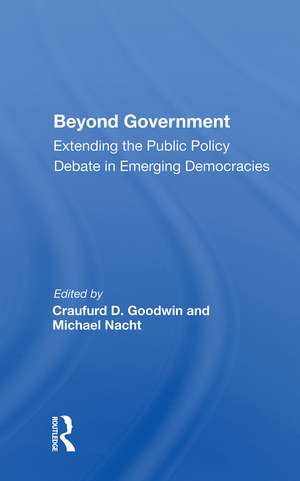Beyond Government: Extending the Public Policy Debate in Emerging Democracies
Editat de Craufurd D. Goodwinen Limba Engleză Hardback – 7 iun 2019
Preț: 764.20 lei
Preț vechi: 1102.79 lei
-31% Nou
Puncte Express: 1146
Preț estimativ în valută:
146.23€ • 159.34$ • 123.22£
146.23€ • 159.34$ • 123.22£
Carte tipărită la comandă
Livrare economică 23 aprilie-07 mai
Preluare comenzi: 021 569.72.76
Specificații
ISBN-13: 9780367016890
ISBN-10: 0367016893
Pagini: 492
Dimensiuni: 143 x 229 mm
Greutate: 0.45 kg
Ediția:1
Editura: Taylor & Francis
Colecția Routledge
Locul publicării:Oxford, United Kingdom
ISBN-10: 0367016893
Pagini: 492
Dimensiuni: 143 x 229 mm
Greutate: 0.45 kg
Ediția:1
Editura: Taylor & Francis
Colecția Routledge
Locul publicării:Oxford, United Kingdom
Cuprins
Preface -- Introduction: Public Debate in a Free Society -- Models from a Mature Democracy -- The Fifth Estate: Institutions for Extending Public Policy Debate in Emerging Democracies—Lessons from the American Experience -- The American National Security Debate: Its Relevance for Emerging Democracies -- Two Decades in the Front Office: Reflections on How the Carnegie Endowment for International Peace Operated in Cold War Washington -- Debate during Transitions to Democracy -- Democratic Citizens in Wild Markets: Menem's Neoliberal Experiment in Argentina -- PARTICIPA "Lobbies" for Democracy -- Hope and Anguish: Prospects for Political Pluralism in Post-Ceausescu Romania -- The Opening of Public Debate on Economic Policy in Bulgaria -- Areas of Public Policy Debate -- The Czechoslovakian Divorce; "Velvet" Settlement, or Muted Coexistence? -- Public Debate on Poverty in Hungary since the 1960s -- Economic Policy in Public Debate: A Romanian Perspective -- Decentralization as a Tool for Democratic Consolidation: The Brazilian Challenge -- Environmental Politics and Policy in Bulgaria: Challenges and Constraints to Democratization -- Institutions That Foster Debate -- Democracy and Institution Building in Mexico: A Case Study -- The Role of the Press in the Democratization of Poland -- Academies of Science in Emerging Democracies -- The Role of the Intelligentsia as a Political Elite in Czechoslovakia -- Strengthening Democracy, Accelerating Economic Growth, and Promoting Equality: The Changing Role of Brazilian Scholars -- Nongovernmental Think Tanks in Poland -- Contributions from Abroad -- Spring into Summer: The Role of Private Foundations in Extending Public Debate in Central and Eastern Europe -- The Role of Overseas Foundations in Emerging Democracies: The Ford Foundation's Office for the Andes and Southern Cone -- International Business and Public Policy Debate in Latin America -- Conclusion: Public Debate in a Free Society
Descriere
Beyond Government examines how vigorous and truly pluralistic policy debate has evolved in both mature and emerging democracies and then suggests how it may be encouraged from within and sustained by outside assistance. The contributors argue that a strong democracy thrives on a rich population of organizations and individuals that respond to the issues of the moment, the concerns of groups within society that wish to be heard, and the styles of interaction that seem most appropriate at any given time. The volume has five parts. In the first, three U.S.-based authors present models of public debate from the American experience. In the second part, four authors—two from Latin America and two from Eastern Europe—chronicle and analyze the public debate that accompanied their countries' transitions to democracy. The third section includes chapters on specific areas of policy research, the fourth shifts attention to the institutions that foster debate, and the fifth assesses contributions to public debate from abroad by foundations and the corporate sector. A concluding section looks ahead to challenges and opportunities.
